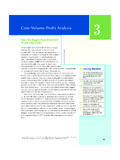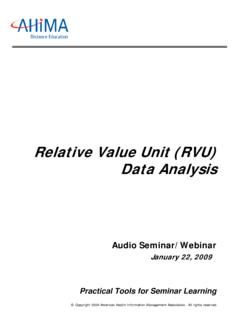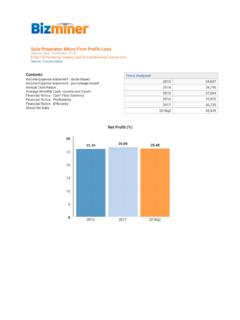Transcription of The Effects of a Minimum-Wage Increase on …
1 25th Percentile of Workers Wages10th Percentile of Workers WagesFederal Minimum Wage$ Option$ OptionCurrent Law4681012019731993198320031978199819882 00820132013 Dollars per HourActualProjectedCONGRESS OF THE UNITED STATESCONGRESSIONAL BUDGET OFFICECBOThe Effects of a Minimum-Wage Increase on Employment and Family IncomeFEBRUARY 2014 CBON otesEstimates of the effect on employment of the options to Increase the minimum wage are rounded to the nearest 100,000 workers. Numbers in the text, tables, and figures may not add up to totals because of No. 4856 ContentsCBOS ummary1 What Options for Increasing the Minimum Wage Did CBO Examine?1 What Effects Would Those Options Have?1 The Current Federal Minimum Wage4 Two Options for Increasing the Federal Minimum Wage4A $ Option5A $ Option6 How Increases in the Minimum Wage Affect Employment and Family Income6 Employment6 Family Income8 CBO s Findings About Employment and Family Income8 Effects of the Options on Employment9 Effects of the Options on Family Income11 The Effect of an Increase in the Minimum Wage on the Federal Budget13 BOX:THE MINIMUM WAGE AND THE EARNED INCOME TAX CREDIT15 Effects for People Whose Income Would Rise16 Effects for People Whose Income Would Fall17 Appendix A: The Basis of CBO s Findings19 Appendix B: Research About the Effects of Minimum-Wage Increases33 List of Tables and Figures38 About This Document39 CBOThe Effects of a Minimum-WageIncrease on Employment andFamily IncomeSummaryIncreasing the minimum wage would have two principal Effects on low-wage workers.
2 Most of them would receive higher pay that would Increase their family s income, and some of those families would see their income rise above the federal poverty threshold. But some jobs for low-wage workers would probably be eliminated, the income of most workers who became jobless would fall substantially, and the share of low-wage workers who were employed would probably fall Options for Increasing the Minimum Wage Did CBO Examine? For this report, the Congressional Budget Office (CBO) examined the Effects on employment and family income of two options for increasing the federal minimum wage: A $ option would Increase the federal minimum wage from its current rate of $ per hour to $ per hour in three steps in 2014, 2015, and 2016. After reaching $ in 2016, the minimum wage would be adjusted annually for inflation as measured by the consumer price index. A $ option would raise the federal minimum wage from $ per hour to $ per hour in two steps in 2015 and 2016.
3 After reaching $ in 2016, the minimum wage would not be subsequently adjusted for Effects Would Those Options Have?The $ option would have substantially larger Effects on employment and income than the $ option would because more workers would see their wages rise; the change in their wages would be greater; and, CBO expects, employment would be more responsive to a Minimum-Wage Increase that was larger and was sub-sequently adjusted for inflation. The net effect of either option on the federal budget would probably be of the $ Option on Employment and Income. Once fully implemented in the second half of 2016, the $ option would reduce total employment by about 500,000 workers, or percent, CBO projects. As with any such estimates, however, the actual losses could be smaller or larger; in CBO s assessment, there is about a two-thirds chance that the effect would be in the range between a very slight reduction in employment and a reduction in employment of million workers (see Ta b l e 1 ).
4 Many more low-wage workers would see an Increase in their earnings. Of those workers who will earn up to $ under current law, most about million, according to CBO s estimates would have higher earn-ings during an average week in the second half of 2016 if the $ option was Some of the people earning slightly more than $ would also have higher earnings under that option, for reasons discussed below. Further, a few higher-wage workers would owe their jobs and increased earnings to the heightened demand for goods and services that would result from the Minimum-Wage Increase . 1. In addition to the people who became jobless, some workers earning less than $ per hour and not covered by Minimum-Wage laws would also not have increased Effects OF A Minimum-Wage Increase ON EMPLOYMENT AND FAMILY INCOMEFEBRUARY 2014 CBOT able Effects on Employment, Income, and Poverty of an Increase in the Federal Minimum Wage, Second Half of 2016 Source.
5 Congressional Budget Office based on monthly and annual data from the Census Bureau s Current Population The minimum wage would rise (in three steps, starting in 2014) to $ by July 1, 2016, and then be indexed to The minimum wage would rise (in two steps, starting in 2015) to $ by July 1, 2016, and would not be subsequently indexed to Uses values at or near the midpoints of estimated ranges for key In CBO s assessment, there is a two-thirds chance that the actual effect would be within this Some of the people with hourly wages slightly above the proposed minimum wage would also have increased earnings under the in real (inflation-adjusted) income include increases in earnings for workers who would receive a higher wage, decreases in earnings for workers who would be jobless because of the Minimum-Wage Increase , losses in income for business owners, decreases in income because of increases in prices, and increases in income generated by higher demand for goods and Calculated using before-tax family cash income.
6 Poverty thresholds vary with family size and composition. The definitions of income and of poverty thresholds are those used to determine the official poverty rate and are as defined by the Census Bureau. CBO projects that in 2016, the poverty threshold (in 2013 dollars) will be about $18,700 for a family of three and $24,100 for a family of four. The increased earnings for low-wage workers resulting from the higher minimum wage would total $31 billion, by CBO s However, those earnings would not go only to low-income families, because many low-wage workers are not members of low-income families. Just 19 percent of the $31 billion would accrue to families with earnings below the poverty threshold, whereas 29 percent would accrue to families earning more than three times the poverty threshold, CBO Moreover, the increased earnings for some workers would be accompanied by reductions in real (inflation-adjusted) income for the people who became jobless because of the Minimum-Wage Increase , for business owners, and for consumers facing higher prices.
7 CBO examined family $ Optiona$ OptionbCentral estimatec-500,000 workers-100,000 workersLikely rangedVery slight decrease toVery slight Increase million workers-200,000 workersNumber of Workers With Hourly Wages Less Than the Proposed Minimum Whose Earnings Would Increase in an Average Weeke millionFamilies whose income is below the poverty threshold$5 billion$1 billion$12 billion$3 billionFamilies whose income is between three and six timesthe poverty threshold$2 billion$1 billion-$17 billion-$4 billion-900,000-300,000 Change in the Number of People Below the Poverty ThresholdgFamilies whose income is between one and three times the poverty thresholdFamilies whose income is six times the poverty threshold or moreChange in Real Income (2013 dollars, annualized)fChange in Employment2. All Effects on income are reported for the second half of 2016; annualized (that is, multiplied by two); and presented in 2013 Poverty thresholds vary with family size and composition; CBO projects that in 2016, the poverty threshold (in 2013 dollars) will be about $18,700 for a family of three and $24,100 for a family of 2014 THE Effects OF A Minimum-Wage Increase ON EMPLOYMENT AND FAMILY INCOME3 CBOincome overall and for various income groups, reaching the following conclusions: Once the increases and decreases in income for all workers are taken into account, overall real income would rise by $2 billion.
8 Real income would Increase , on net, by $5 billion for families whose income will be below the poverty threshold under current law, boosting their average family income by about 3 percent and moving about 900,000 people, on net, above the poverty threshold (out of the roughly 45 million people who are projected to be below that threshold under current law). Families whose income would have been between one and three times the poverty threshold would receive, on net, $12 billion in additional real income. About $2 billion, on net, would go to families whose income would have been between three and six times the poverty threshold. Real income would decrease, on net, by $17 billion for families whose income would otherwise have been six times the poverty threshold or more, lowering their average family income by of the $ Option on Employment and Income. The $ option would reduce employment by about 100,000 workers, or by less than percent, CBO pro-jects.
9 There is about a two-thirds chance that the effect would be in the range between a very slight Increase in employment and a reduction in employment of 200,000 workers, in CBO s assessment. Roughly million workers who will earn up to $ per hour under cur-rent law would have higher earnings during an average week in the second half of 2016 if this option was imple-mented, CBO estimates, and some people earning more than $ would have higher earnings as well. The increased earnings for low-wage workers resulting from the higher minimum wage would total $9 billion; 22 percent of that sum would accrue to families with income below the poverty threshold, whereas 33 percent would accrue to families earning more than three times the poverty threshold, CBO estimates. For family income overall and for various income groups, CBO estimates the following: Once the increases and decreases in income for all workers are taken into account, overall real income would rise by $1 billion.
10 Real income would Increase , on net, by about $1 billion for families whose income will be below the poverty threshold under current law, boosting their average family income by about 1 percent and moving about 300,000 people, on net, above the poverty threshold. Families whose income would have been between one and three times the poverty threshold would receive, on net, $3 billion in additional real income. About $1 billion, on net, would go to families whose income would have been between three and six times the poverty threshold. Real income would decrease, on net, by $4 billion for families whose income would otherwise have been six times the poverty threshold or more, lowering their average family income by about of a Minimum-Wage Increase on the Federal Budget. In addition to affecting employment and family income, increasing the federal minimum wage would affect the federal budget directly by increasing the wages that the federal government paid to a small number of hourly employees and indirectly by boosting the prices of some goods and services purchased by the government.






